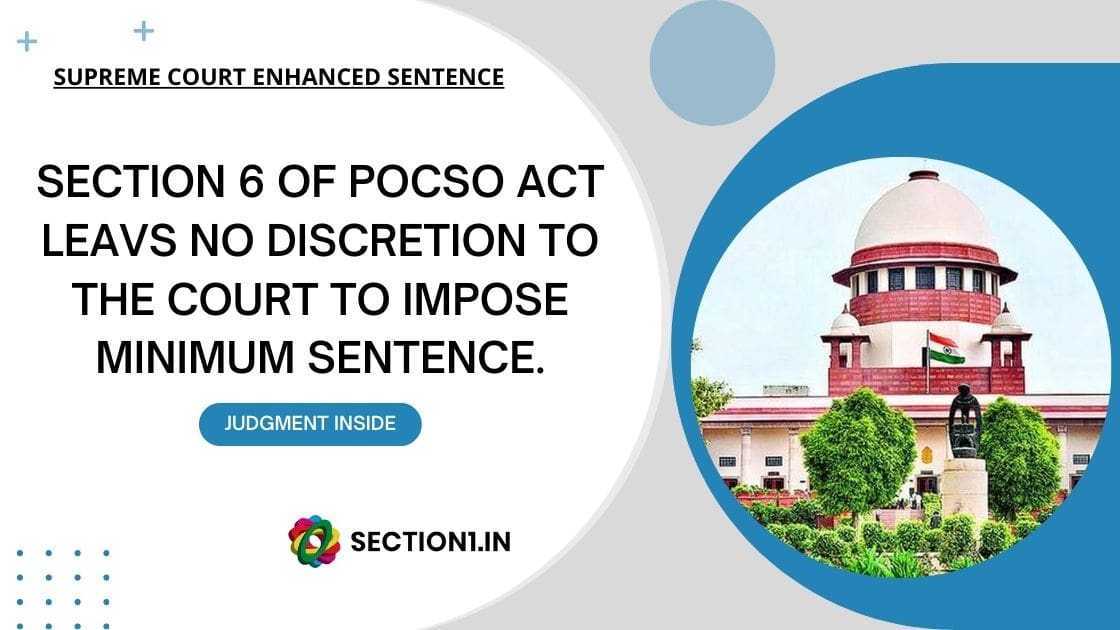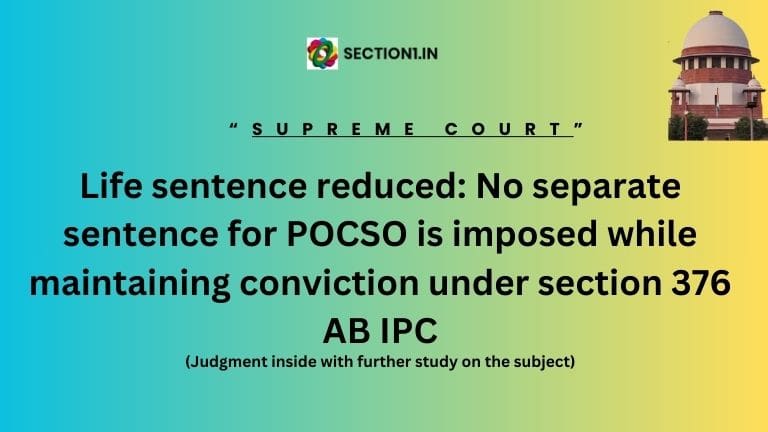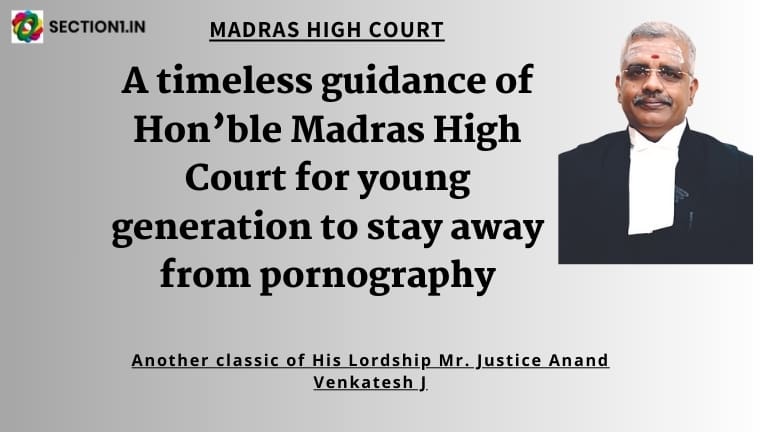FACTUAL ASPECTS
1. The only question involved in this appeal is whether the Respondent is guilty of an offence of aggravated penetrative sexual assault punishable under Section 6 of the Protection of Children from Sexual Offences Act, 2012 (for short, ‘the POCSO Act’).
2. The respondent–accused was prosecuted for the offences punishable under Sections 377 and 506 of the Indian Penal Code, 1860 (for short, ‘IPC’) and Section 5 read with Section 6 of the POCSO Act. The learned 8th Additional Sessions Judge, Jhansi who was the Special Judge under the POCSO Act convicted the respondent for all three offences. The respondent was sentenced to undergo rigorous imprisonment for ten years for the offence punishable under Section 6 of the POCSO Act and was directed to pay a fine of Rs.5,000/. The respondent was sentenced to undergo rigorous imprisonment for seven years for the offence punishable under Section 377 of IPC. For the offence punishable under Section 506 of IPC, he was sentenced to undergo rigorous imprisonment for one year. For the last two offences, a fine was also imposed.
3. The respondent preferred Criminal Appeal No.5415 of 2018 before the High Court of Judicature at Allahabad. By the impugned judgment, the High Court held that the respondent was guilty of the offence of penetrative sexual assault punishable under Section 4 of the POCSO Act and not the offence of aggravated penetrative sexual assault punishable under Section 6 of the POCSO Act. Therefore, his substantive sentence for the offence punishable under the POCSO Act was brought down to imprisonment for seven years with a fine of Rs.5,000/. Only to this extent, the appeal was allowed.
OUR VIEW
7. There is no dispute about the correctness of the finding recorded in paragraph 16 of the impugned judgment of the High Court, which we have quoted above. In this context, it is necessary to note the definition of ‘penetrative sexual assault’ incorporated in Section 3 of the POCSO Act. Clause (a) of Section 3 reads thus:
“3. Penetrative Sexual Assault.
A person is said to commit “penetrative sexual assault” if –
(a) he penetrates his penis, to any extent, into the vagina, mouth, urethra or
anus of a child or makes the child to do so with him or any other person; or
(b) .. .. .. .. .. .. .. .. .. .. .. ..
(c) .. .. .. .. .. .. .. .. .. .. .. ..
(d) .. .. .. .. .. .. .. .. .. .. .. ..”
8. Section 2(a) of the POCSO Act provides that ‘aggravated penetrative sexual assault’ has the same meaning as assigned to it in Section 5. Therefore, we come to Section 5, which defines ‘aggravated penetrative sexual assault’. Clause (m) of Section 5 reads thus: “…”
9. Considering the finding recorded in paragraph 16 of the impugned judgment, obviously in this case, the respondent has committed an offence of aggravated penetrative sexual assault as he has committed penetrative sexual assault on a child below twelve years. Clause (m) of Section 5 is attracted in this case.
10. Section 6, as applicable before its substitution on 16th August 2019, read thus:
“6. Punishment for aggravated penetrative sexual assault.—Whoever, commits aggravated penetrative sexual assault, shall be punished with rigorous imprisonment for a term which shall not be less than ten years but which may extend to imprisonment for life and shall also be liable to fine.”
On the date of the commission of the offence, rigorous imprisonment for ten years was the minimum sentence prescribed for the offence of aggravated penetrative sexual assault. From 16th August 2019, the minimum sentence has been enhanced to twenty years. However, the amended provision will not apply to this case as the incident has taken place prior to 16th August 2019.
11. Surprisingly, the High Court has observed that Section 5 was not applicable, and the offence committed by the respondent falls under the category of a lesser offence of penetrative sexual assault, which is punishable under Section 4 of the POCSO Act. Thus, the High Court committed an obvious error by holding that the act committed by the respondent was not an aggravated penetrative sexual assault. In fact, the Special Court was right in punishing the respondent under Section 6 and sentencing him to undergo rigorous imprisonment for ten years with a fine of Rs.5,000/.
12. The POCSO Act was enacted to provide more stringent punishments for the offences of child abuse of various kinds and that is why minimum punishments have been prescribed in Sections 4, 6, 8 and 10 of the POCSO Act for various categories of sexual assaults on children. Hence, Section 6, on its plain language, leaves no discretion to the Court and there is no option but to impose the minimum sentence as done by the Trial Court. When a penal provision uses the phraseology “shall not be less than….”, the Courts cannot do offence to the Section and impose a lesser sentence. The Courts are powerless to do that unless there is a specific statutory provision enabling the Court to impose a lesser sentence. However, we find no such provision in the POCSO Act. Therefore, notwithstanding the fact that the respondent may have moved ahead in life after undergoing the sentence as modified by the High Court, there is no question of showing any leniency to him. Apart from the fact that the law provides for a minimum sentence, the crime committed by the respondent is very gruesome which calls for very stringent punishment. The impact of the obnoxious act on the mind of the victim child will be lifelong. The impact is bound to adversely affect the healthy growth of the victim. There is no dispute that the age of the victim was less than twelve years at the time of the incident. Therefore, we have no option but to set aside the impugned judgment of the High Court and restore the judgment of the Trial Court.
13. Accordingly, the appeal is allowed. The impugned judgment and order dated 18th November 2021 passed by the High Court of Judicature at Allahabad in Criminal Appeal No.5415 of 2018 is quashed and set aside and the judgment and order dated 24th August 2018 passed by the learned 8th Additional Sessions Judge, Special Judge POCSO Act, Jhansi in Special Session Trial No.134 of 2016 is restored. Accordingly, Criminal Appeal No.5415 of 2018 filed before the High Court stands dismissed. The respondent shall undergo rigorous imprisonment for ten years for the offence punishable under Section 6 of the POCSO Act and shall pay a fine of Rs.5,000/. We direct the respondent to surrender before the learned Special Judge under the POCSO Act, Jhansi within a maximum period of one month. On his surrender, the Special Court shall send the respondent to prison for undergoing the remaining sentence for the offence punishable under Section 6 of the POCSO Act. On failure of the respondent to surrender within one month from today, the Special Court shall forthwith issue a nonbailable warrant against the respondent and ensure that the respondent is committed to prison for undergoing the remaining sentence for the offence punishable under Section 6 of the POCSO Act. A copy of this judgment shall be immediately forwarded to the Special Court.
PARTY: State of U.P versus Sonu Kushwaha – CRIMINAL APPEAL NO: 1633 of 2023 – July 5, 2023.
https://main.sci.gov.in/supremecourt/2022/27603/27603_2022_12_1504_44778_Judgement_05-Jul-2023.pdf






